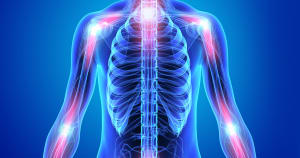
Inflammation is a primary function of your body’s defensive mechanism, that aids with healing by removing harmful or foreign pathogens. The basic physiological function starts with White Blood Cells or your body's defensive cells. These WBC cells are used to fight off foreign substances in your body, and in turn, an inflammatory process will follow. The way the inflammatory process is designed to work is when a foreign substance invades your body, receptors on a cell surface will release a variety of chemicals. These chemicals will cause your blood vessels to dilate and increase your capillary permeability bringing more blood into the area. The increased blood flow will also give off heat and produce the reddish color associated with inflammation. The way this process helps the body is it dilutes the harmful substances which allows oxygen and other nutrients to travel through the body. Proteins, that are used for clotting, also enter the affected area.
Sometimes, though, our bodies will cause inflammation without there being any foreign pathogen to fight off. Two types of inflammation may affect the body, acute and chronic inflammation. Acute inflammation is short-term inflammation where signs may be pain, redness, loss of function, swelling, and heat. Chronic inflammation can last for months or years and may have links to issues such as diabetes, CVD, allergies, COPD, and arthritis. Chronic inflammation is the main one where changing lifestyle factors like diet can help.
Here are some tips if you want to work on lowering the risk of getting chronic inflammation.
- Try to decrease the amount of stress: while this may seem daunting try and take some time out of your day to do something you enjoy that helps you lower stress.
- Get 6-8 hours of good quality sleep a night: if you have trouble sleeping speak to a doctor about some things you can try to help this.
- Increase anti-inflammatory foods in your diet: eating lower anti-inflammatory foods can make a huge difference in making you feel better and lowering your risk of chronic inflammation. Some anti-inflammatory foods include: ginger, olive oil, nuts, greens, lean fish & fruits.
- Avoid foods that can cause inflammation: Foods such as fried foods, processed foods, red meat, things containing saturated & trans fat & alcohol have been shown to increase inflammation in our bodies.
Contact us at Genesis Personal Fitness for more information on the topic of inflammation in our bodies & diets or for any of your health and fitness needs.

